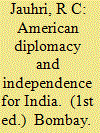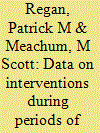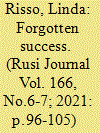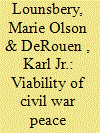|
|
|
Sort Order |
|
|
|
Items / Page
|
|
|
|
|
|
|
| Srl | Item |
| 1 |
ID:
028399


|
|
|
|
|
| Edition |
1st ed.
|
| Publication |
Bombay, Vohra & Co., 1970.
|
| Description |
xi, 160p.hbk
|
|
|
|
|
|
|
|
|
|
|
|
Copies: C:1/I:0,R:0,Q:0
Circulation
| Accession# | Call# | Current Location | Status | Policy | Location |
| 015547 | 954.0359/JAU 015547 | Main | On Shelf | General | |
|
|
|
|
| 2 |
ID:
128861


|
|
|
|
|
| Publication |
2014.
|
| Summary/Abstract |
Interventions into civil conflicts have been the focus of considerable research in recent years, but one of the limitations to many studies has been the emphasis on interventions once a conflict begins. While important, we know that states and other actors often take action prior to the onset of a civil war in hopes of diffusing - or exacerbating - a potentially volatile situation. To date, however, no one has been able to study these pre-conflict interventions because appropriate data did not exist. In this article we introduce a new dataset that fits this specific need. Our data identifies states that are at risk of civil war and codes instances of third-party military, economic, and diplomatic interventions. Based on forecasting models that derive risk scores for all states from 1957 to 2007, we are able to identify those states that are most at risk and provide detailed information about interventions that occur in those states. We include a brief empirical example that applies our new data on interventions to test for their effects on the likelihood of civil war or stability. Consistent with prior arguments regarding interventions during civil wars, we show that military interventions increase the risk of civil war onset, while economic and diplomatic interventions forestall that particular outcome. The limited example highlights just one of the potential uses for our new data. With it at hand, researchers will now have the ability to answer many of the vexing problems surrounding the processes that may or may not lead to civil war.
|
|
|
|
|
|
|
|
|
|
|
|
|
|
|
|
| 3 |
ID:
185918


|
|
|
|
|
| Summary/Abstract |
By collecting and destroying the weapons that had been handed over by rebel Albanian fighters, Operation Essential Harvest ended violence in North Macedonia and paved the way for constitutional change. Through interviews with political and military leaders, and analysis of official sources published by NATO at the time, Linda Risso demonstrates how early diplomatic intervention, the personal commitment of key leaders and a perfectly executed military operation achieved the expected goals within the given timeframe, and contributed significantly to the prevention of another ethnic conflict in the Western Balkans.
|
|
|
|
|
|
|
|
|
|
|
|
|
|
|
|
| 4 |
ID:
147530


|
|
|
|
|
| Summary/Abstract |
Civil war peace agreements are prone to collapse. While some research suggests that multiple layers of power-sharing provisions lead to more viable agreements, others have suggested that negotiated settlements are not only more likely to return to violence, but that those cases will be more deadly as a result. We suggest here that previous research has failed to address the various ways that peace agreements emerge and that this context is crucial in explaining peace agreement viability. In some situations, rebels are likely to earn those concessions through battlefield success. Governments may feel compelled to address underlying grievances in order to stop the bloodshed and ultimately maintain some political clout in the postwar regime. In other cases, however, governments may feel pressure to engage in discussions and to provide concessions by outside actors, whether in the form of diplomatic intervention, economic, or foreign military intervention. Hypotheses are tested on all civil war peace agreements identified by the UCDP Peace Agreement Data-set for 1975–2011. Findings from logit and hazard models suggest that agreements brought about in the aftermath of military intervention on behalf of rebels are more likely to endure while those earned on the battlefield (i.e., stronger rebels) do not. In addition, mediation enhances peace agreement viability, while interventions on behalf of governments tend to undermine it.
|
|
|
|
|
|
|
|
|
|
|
|
|
|
|
|
|
|
|
|
|